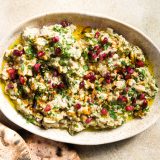In the vast and mountainous desert of Wadi Rum, where the nights—even the days—can be shockingly cold and firewood is scarce, the Bedouins have become masters at ensuring that no bit of heat from their hearths is wasted. It was a lesson I was primed to appreciate after spending a windy night bundled in a tent with walls of double-thick blankets.
While Abu Sultan, the owner of this tiny camp among the dunes, demonstrated how his family bakes abud, a cracker-like bread, by burying a wet whole-wheat dough in the still-warm ashes of the fire we’d huddled around the night before, my guide, Ihab Muhtaseb, prepared what would be the star of our breakfast—mutabal.
Versions of this baba ghanoush-like eggplant dip are eaten across the Middle East. Here in Jordan, it is distinguished by the delicious balancing act between the dish’s three primary ingredients—rich, slightly bitter roasted eggplant; creamy, savory tahini; and bright pops of tangy acidity from lemon juice and pomegranate.
Muhtaseb made his simply, and wonderfully, by resting several eggplants in the coals alongside Sultan’s abud. Once charred and tender, he peeled them, then mashed them with his knife before stirring in the citrus, garlic, salt and tahini. Cracking open a pomegranate, he scattered its seeds over the top.
The result was ridiculously good, an explosion of taste and texture eked, quite literally, from the ashes. It was a dish I’d encounter repeatedly during my time in Jordan, sometimes topped with a simple salad of green chilies, tomatoes and cucumber. All were delicious, though none quite as romantic as the one scooped with Sultan’s abud in the desert.
Char It and Sauce It! A Better, Bolder Eggplant Dip
J.M. Hirsch

Get the Recipe
Eggplant and Tahini Dip (Mutabal)

Get the Recipe
Tomato, Cucumber and Green Chili Salad
Rich with tahini and pomegranate, mutabal pairs perfectly with flatbread.
Photos: Christopher Warde-Jones; Connie Miller of CB Creatives; Styling: Christine Tobin






